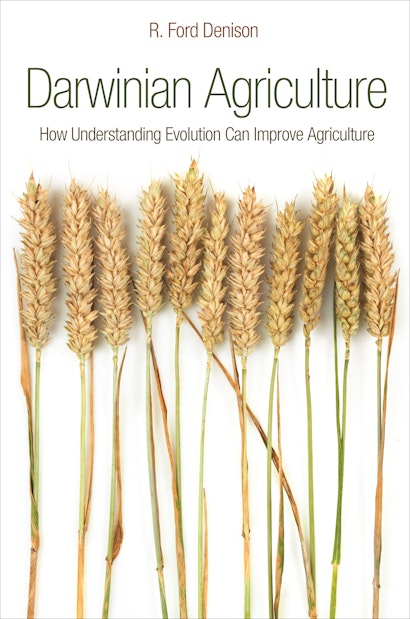As human populations grow and resources are depleted, agriculture will need to use land, water, and other resources more efficiently and without sacrificing long-term sustainability. Darwinian Agriculture presents an entirely new approach to these challenges, one that draws on the principles of evolution and natural selection.
R. Ford Denison shows how both biotechnology and traditional plant breeding can use Darwinian insights to identify promising routes for crop genetic improvement and avoid costly dead ends. Denison explains why plant traits that have been genetically optimized by individual selection—such as photosynthesis and drought tolerance—are bad candidates for genetic improvement. Traits like plant height and leaf angle, which determine the collective performance of plant communities, offer more room for improvement. Agriculturalists can also benefit from more sophisticated comparisons among natural communities and from the study of wild species in the landscapes where they evolved.
Darwinian Agriculture reveals why it is sometimes better to slow or even reverse evolutionary trends when they are inconsistent with our present goals, and how we can glean new ideas from natural selection’s marvelous innovations in wild species.
"Darwinian Agriculture offers an engaging and bold explanation of why agricultural research must take better advantage of insights from evolutionary biology."—Allison A. Snow, Science
"Darwinian Agriculture shows just how much plant breeding and biotechnology can learn from evolutionary biology, and takes an honest look at agricultural techniques from genetic engineering to organic farming."—Biologist
"Denison's book begins with a broadly accessible introduction to key concepts of evolution and sustainable agriculture, drawing the reader in with a blend of good storytelling, sound science, and fascinating examples of natural parallels to the agricultural system. . . . Even readers who begin the book with little understanding of evolution can finish it with an appreciation of how current research applies evolutionary theory to advance agriculture."—Choice
"This book is a rich source of information for evolutionary biologists, biotechnologists and agriculturalists. It illustrates important evolutionary principles in an accessible way, using the farm of brother Tom as a recurrent tangible example. Evolutionary concepts, such as kin selection and relatedness are explained clearly, and illustrated with many examples that can be used for teaching. I can recommend this book to all students of evolutionary biology and ecology who are not afraid of applications. In fact, I may want to recommend it even more strongly to all those researchers, institutes and companies whose research aim it is to face the challenge of a growing world population that needs to be fed on a planet on which the climate is rapidly changing. Denison's arguments are convincing and we as humans may be missing out on a bright future if we ignore this book."—Duur K. Aanen, Evolution
"Darwinian Agriculture provides an interesting and passionate but rather personal perspective that certainly challenges us to think a lot harder about what eco-evolutionary principles might have to offer agriculture (and vice versa), and it will hopefully stimulate a lot more scientists to conduct research across the agroecological interface."—Peter H. Thrall, Evolutionary Applications
"This is an extremely interesting and provocative book and written in a very engaging way. . . . It is clear what Denison thinks about the topics he raises but he also brings in the opinion and experiments of others to provide breadth of examples and case studies. It is an ideal book for a graduate seminar or undergraduate capstone course. . . . If you're only going to buy one hard cover book this year, this should be it. By the time you're finished, the page margins will be filled with annotations!"—Marshall D. Sundberg, Plant Science Bulletin
"This volume is yet another winner from Princeton. . . . Although I have known the author for several years, I had no idea of the depth of his knowledge and amount of thought he has given to the topics covered in this book . . . The fact that reading this book kept me fully occupied on a 13 hour flight is a testimony to its interesting contents."—Janet Sprent, Bulletin of the British Ecological Society
"Above all, Denison's book makes farming seem like the greatest show on earth and the most exciting game in town. Everyone reading it will want to become a farmer!"—Stanley Shostak, European Legacy
"Darwinian Agriculture seems to provide important contributions for researchers as well as other experts and stakeholders in fields like agronomy, animal husbandry, breeding, pest control and nutrition. Moreover, this book also provides valuable insights for economists who have an interest in agriculture, ecology, and last but not least economic theory."—Alfons Balmann, Journal of Bioeconomics
"Darwinian Agriculture is a very important contribution to our understanding of the links between nature and agriculture, and to the future of our human race. Denison underpins his arguments with an incredible wealth of insight and knowledge about plants, animals, physics, chemistry, biology, and ecology. The depth and breadth of scholarship embodied in this book is stunning. I know of nothing else like it."—Kenneth G. Cassman, University of Nebraska
"I found this book to be tremendously interesting and thought-provoking. Darwinian Agriculture should be read by everyone interested in increasing agricultural production in a sustainable way—from biotechnologists to agronomists, and everyone in between."—Jay A. Rosenheim, University of California, Davis


